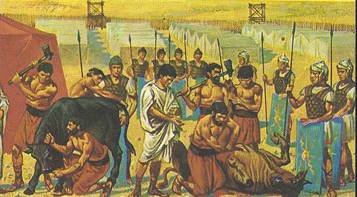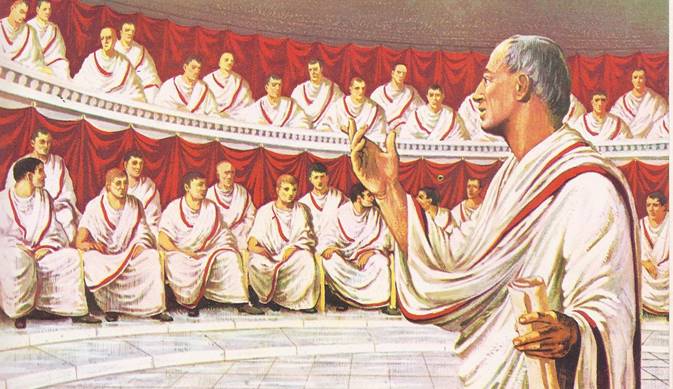ON ROME’S first day, Romulus took a bronze plow and drew a magic circle around seven of the hills that stood beside the River Tiber. The magic of the circle was protection against the evils outside. More important, it bound together the people who were inside, making one city where there had been six towns. Seven hundred years later, Augustus drew another magic circle, this time around all the Mediterranean world. It kept out barbarian and Asian invaders and held together millions of people, making one empire where there had been dozens of races and nations. So long as the circle had its magic power, Rome would exist. There was no magic in the circles themselves. The real magic had been in Romulus himself, a chief who was strong and wise enough to build a city. There had been magic, too, in Augustus, whose wisdom had brought order and peace to an empire. Without such men, the circles were powerless. Invaders and conquerors could break through them. The people and countries they held together would fall apart. That was what happened to Rome after the death of Marcus Aurelius. TOO MANY CAESARS It did not happen all at once. There was still an empire and there were emperors who tried to rule it — too many, in fact. When Commodus was murdered, four would-be rulers, each with a Roman army behind him, fought over the throne. The winner, Septimus Severus, the commander of the Danube troops, held it for eighteen years. When he was about to die, he gave his two sons a piece of advice about ruling Rome: “Stick together, pay the soldiers and forget the rest.” His sons did not stick together. When Septimus was dead, each of them tried to be the emperor. Caracalla, the elder of …
Read More »The City of Augustus 29 B. C. – A. D. 14
IN 29 B.C. the gates of war were closed. Rome was at peace. Senators and the people of the mob-men who had hated and fought each other through long, bitter years — stood side by side in the Forum while the great doors of the temple of Janus were slowly pushed shut. That had happened only twice before in the history of the city. The crowd in the Forum cheered the peace and they cheered Octavius, their new ruler. He was no longer the young man who had rushed to Rome after the murder of his uncle, Caesar. Seventeen years had passed since then — seventeen years of hard campaigning, of friends who became enemies and of alliances that were broken. He was still handsome and his sharp eyes could still look through a man. He walked with a new dignity that won him the respect of the people and Senate alike. Wherever he went, cheering crowds followed him. His friends told him that he could make himself the king of Rome. Octavius remembered what had happened when Caesar had thought of becoming a king. Caesar had proved that one man with an army could do what the bickering Senate and the mob could not do: he could run the empire. A world with millions of people in it was still like the smallest Roman family; it worked best with only one pater familiar. Octavius meant to be that all powerful father of Rome, but he intended to let the Romans think that they had asked him to be it. He celebrated his Triumph with processions that went on for three days. With the treasures he had won in Egypt, he bought land to give to his soldiers. He ordered the building of a splendid temple to Apollo, as he …
Read More »The City Divided 130 B. C. – 70 B. C.
MARCUS TULLIUS CICERO, a young statesman known for his dramatic speeches, stood before a panel of judges in a courtroom in Rome. He stared at them angrily. For fifty days he had travelled through Sicily, collecting facts about the crimes committed by Caius Verres, the man who was on trial. Now the judges had told him that there would not be time to listen to his evidence. Cicero knew that the judges had been bribed. For it was no ordinary criminal that he meant to send to prison or to death. Caius Verres was an aristocrat and a senator and had served for three years as the governor of the province of Sicily. Verres’ lawyer was Hortensius, the leader of the aristocrats. Indeed, every rich or important man in Rome seemed to be supporting Verres, but Cicero was determined that this man should not escape judgment. He turned to Hortensius and offered to present his case in one day. “Would the court have time enough for that?” ‘ he asked sarcastically. Hortensius was surprised, but he smiled and told Cicero to try it if he liked. The judges agreed. For a moment there was silence in the courtroom, as Cicero turned to face the benches where the long lines of judges sat. Sternly he looked from man to man until he was certain all their eyes were on him. Then he began to speak. He listed Verres’ crimes: When he was governor and the commander of Rome’s army in Sicily, he had taken for himself the money raised to pay the troops. When he was governor and responsible for order and justice in the province, he had taken more money to allow pirates to rob the ports, to set criminals free and to condemn innocent men. For gold, he had …
Read More »City of Romulus B. C. 900 – 256
In the time when savage warriors roamed the plains and mountains of Italy, there stood on six low hills, just south of the river Tiber, six clusters of round huts made of twigs and leaves stuck together with mud. Each was a little town, the home of barbarian tribesmen. They herded cattle on the plain below, chased the wild pigs in the woods and tried to make things grow in their marshy fields. Although the towns were always fighting or stealing cattle and sheep from each other, they shared a market place in a clearing beside the river. They also shared a crude fortress of heaped-up earth and rocks on a seventh hill. The huts on the hills, the market place, the fortress – this, about B. C. 900, a hundred years or so before the Etruscans came to Italy, was Rome. Then a powerful chief came to the place of the seven hills. When he had built a great hut of his own, on the widest of them, he called together the chiefs of the six towns. He told them that he planned to build a city on their hills and that their towns would all be parts of it. Whether the old chiefs agreed to the plan or not, it was done. On the day in April which was the feast day of Pales, the guardian god of herds and flocks, the new chief performed the solemn ritual of the founding of his city. With a bronze plow, drawn by a caw and a bull yoked together, he dug one furrow – a sacred line that marked the city’s boundaries, the place where its walls would be built. He traced the lines of two main streets – one running north and south, one east-and-west and crossing in the …
Read More »



